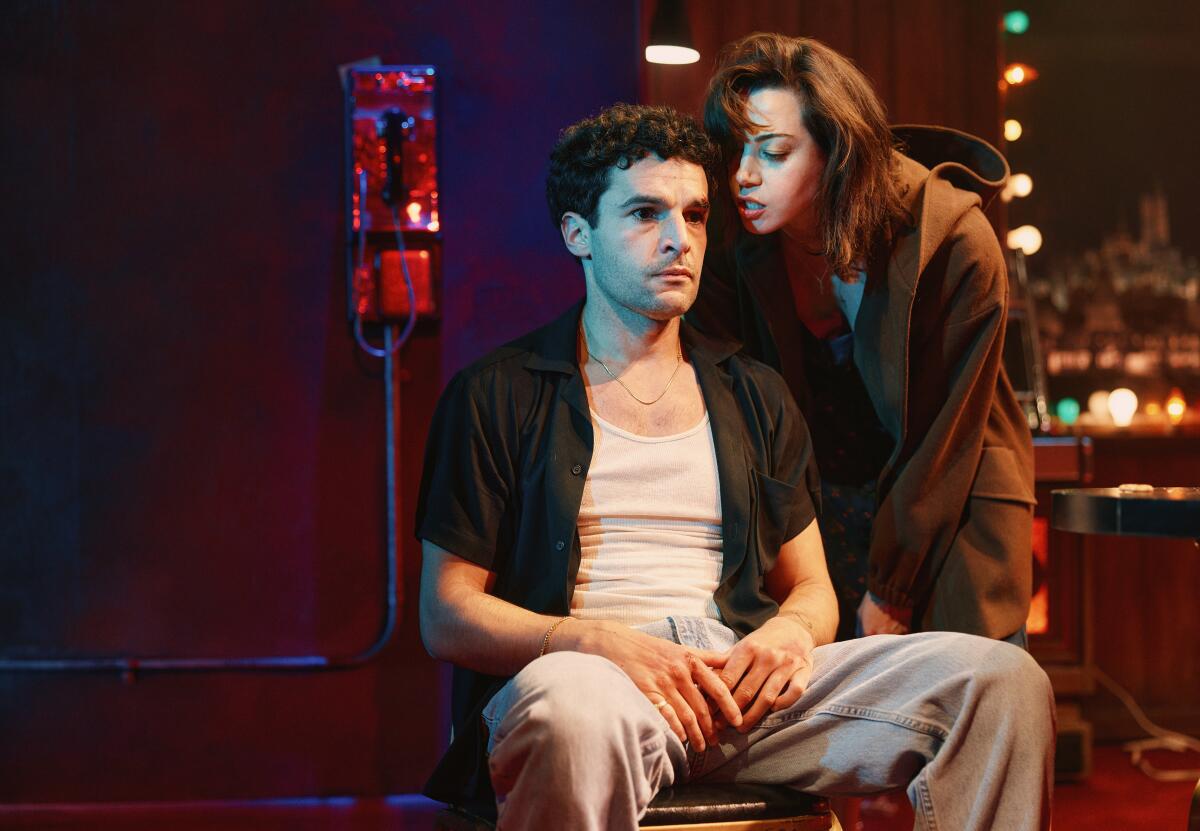Commentary: Aubrey Plaza goes off in her off-Broadway debut, ‘Danny and the Deep Blue Sea’

- Share via
In season two of HBO’s “The White Lotus,” Aubrey Plaza plays Harper, an employment lawyer with a pinched, plaintive expression that seems perpetually on the verge of freezing into a sarcastic smirk.
Harper’s air of annoyance isn’t unwarranted. Not only is her marriage to Ethan, a tech genius whose company hit the jackpot, increasingly sexless, but the couple has been dragged on vacation to a luxurious Sicilian resort, the guests of Ethan’s college roommate, a playboy manipulator who feels entitled to plunder whatever gains his brainiac buddy has acquired.
Plaza, whose comedy chops were honed on NBC’s “Parks and Recreation,” wrings a complete biography from her character’s uningratiating manner. The reluctant small talk and disgruntled politeness speak volumes. Words aren’t needed to convey the extent of the character’s frustration. Harper makes a scene by conspicuously not making a scene.
In her stage debut off-Broadway at the Lucille Lortel Theatre, Plaza plays the screaming antithesis of Harper in a revival of John Patrick Shanley’s 1983 two-hander, “Danny and the Deep Blue Sea.” Roberta, her character, broadcasts her rage as though performing it for all of Yankee Stadium. To say she has a chip on her shoulder would misrepresent the scale of the problem. Roberta is 90% chip.
The play, a parable of intimacy, begins in a desolate dive bar in the Bronx. The setting, a kind of low-rent limbo, isn’t meant to be realistic. The onus is on the performers to flesh out the milieu — one of the reasons the play is a favorite of acting students.
The characters are florid outer-borough types — characters with a capital “k.” Plaza’s Roberta is seated at one table like a balled-up fist. Danny (an electrifying Christopher Abbott) is seated at the other, finishing a pitcher of beer and looking like he’s about to jump out of his skin.
Shanley, best known for his Oscar-winning screenplay for the film “Moonstruck” and his Pulitzer Prize- and Tony-winning drama “Doubt: A Parable,” has arranged what might be described as a meet-ugly. Danny asks Roberta if he can have some of her bar pretzels. She reacts as though he demanded a pint of her blood. The world for both of these characters is a battlefield, and any relaxation of vigilance leaves them with an exposed flank.

Danny’s knuckles are bloody from a brawl. Wherever he goes, violence is sure to follow. He tells Roberta that he’ll probably have to fight everybody in the Bronx to get home. He sounds completely crazy, but she’s drawn to crazy. She pulls up a seat and loudly explains why she’s even crazier.
Intimacy demands that you share parts of yourself that you’re ashamed of. Danny and Roberta have secrets that leave them feeling disqualified before they even make the attempt. Danny is worried that he may have killed the guy he just beat up. Roberta, who’s raising her son while living at her parents’ house, is carrying the one sin that may be even more shameful than murder — incest.
“How am I gonna get rid of this!” Roberta asks, referring to her guilt. Danny can’t figure out what she wants from him. She sees a fellow soul adrift and invites him to come home with her. “We’re gonna love each other,” she declares. It would be hard to find a less propitious romance in the annals of world drama. But this is Shanley’s point: Love necessitates a leap over the absurd.
The production, directed by Jeff Ward, has become one of the hottest tickets of New York’s fall theater season, largely on the strength of Plaza’s idiosyncratic star power. At the Lortel, the audience seemed strikingly young and hip, with perhaps a larger than usual percentage of actors in the crowd. (One suspected thespian in the audience shouted at the curtain call, “You both killed it!”)
But the play, a relic of the 1980s, has the feeling of an acting exercise. “Danny and the Deep Blue Sea” may have inaugurated a genre of drama about the histrionic roller coaster of intimacy between the walking wounded. (Lanford Wilson’s “Burn This” and Terrence McNally’s “Frankie and Johnny in the Clair de Lune,” both from 1987, follow in “Danny’s” footsteps.) But there’s something too neatly diagrammatic about Shanley’s lesson.
The scene changes from the bar to Roberta’s bedroom. The script calls for “a mattress on the floor of a little room with no right angles,” but scenic designer Scott Pask creates a fully furnished bedroom straight out of blue-collar New York several generations ago.
The play is performed without intermission. To give the stagehands time to load in the set, some physical theater (choreographed by Bobbi Jene Smith and Or Schraiber) is performed by Plaza and Abbott to foreshadow the extreme psychological dance of their characters. The movement is overextended — shorter would be less hokey — but not ineffective. The emotional stakes are recast in a different theatrical vocabulary.
Plaza and Abbott plunge into the maelstrom of their characters’ sexual encounter. The question of whether they can put their shame to the side and be loved shifts to whether they can forgive themselves for having been tenderly held by the other for a few hours. Roberta wakes up with her toxic past and her rancorous temper. A night she can handle, but a genuine connection is a bridge too far.
Abbott is physically the freer of the two actors. He translates the inner pressure of Danny’s mental state into whirligig movements that are mesmerizing to watch. Plaza drills down into fury and mortification. Her Roberta is prepared to drown in her own abjection, but Abbott’s Danny keeps throwing himself to her as a lifeline.
Plaza’s repertoire of reactions is perhaps better suited to the camera. She’s more of a miniaturist than a maximalist, though the volcanic emotion she taps into is its own theatrical force. To draw out her talents onstage, she needs a more visionary director — and a play that will stylistically challenge her.
Let’s hope she’s only getting her feet wet in “Danny and the Deep Blue Sea” and will brave more adventurous currents next time around. The fierceness of her commitment cries out for greater artistic risk.
At the curtain call, Plaza seemed as though she were coming to after a tumultuous dream, embarrassed almost to be exposed to the public after what she had just internally experienced. It was a sign that Shanley was telling the truth about the greatest distance two human beings can travel without ever leaving the Bronx.
More to Read
The biggest entertainment stories
Get our big stories about Hollywood, film, television, music, arts, culture and more right in your inbox as soon as they publish.
You may occasionally receive promotional content from the Los Angeles Times.











